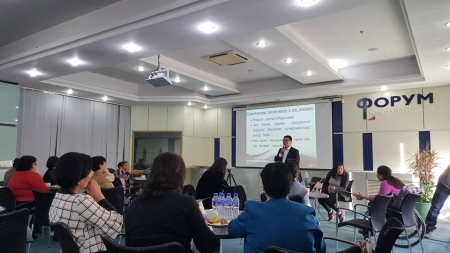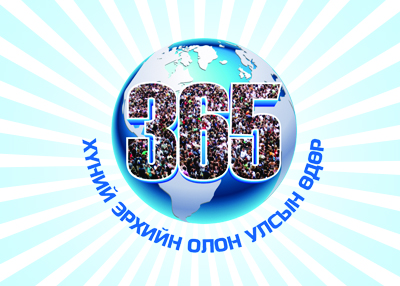 The National Human Rights Commission of Mongolia has raised
its concerns about the reproductive health and rights of girls and women and
quality and accessibility of medical care and services through commissioning
the civil society organizations to conduct study on "Reproductive health and
rights of teenage girls and women” and assessment on "Reproductive health and
rights of girls and women with disabilities and situation of quality and
accessibility of medical services”. Ms.
Chuluundolgor B., Head of the Mongolian National Association of Wheelchair Users,
who played a leading role in conducting this study, and Ms.Enkhjargal B., Human
Rights activist, have participated in this month’s morning tea discussion
as guest speakers.
The National Human Rights Commission of Mongolia has raised
its concerns about the reproductive health and rights of girls and women and
quality and accessibility of medical care and services through commissioning
the civil society organizations to conduct study on "Reproductive health and
rights of teenage girls and women” and assessment on "Reproductive health and
rights of girls and women with disabilities and situation of quality and
accessibility of medical services”. Ms.
Chuluundolgor B., Head of the Mongolian National Association of Wheelchair Users,
who played a leading role in conducting this study, and Ms.Enkhjargal B., Human
Rights activist, have participated in this month’s morning tea discussion
as guest speakers.

 During the discussion, the guest speakers highlighted that it
is a first ever study that was carried out in Mongolia. Due to the lack of
statistical data and comprehensive information on reproductive health issues of
girls and women with disabilities, the government was unable to identify the
needs and to implement specific measures tailored to the requirements for those
people before. As findings of the study and research, the researchers
introduced the following three issues that need to be addressed:
During the discussion, the guest speakers highlighted that it
is a first ever study that was carried out in Mongolia. Due to the lack of
statistical data and comprehensive information on reproductive health issues of
girls and women with disabilities, the government was unable to identify the
needs and to implement specific measures tailored to the requirements for those
people before. As findings of the study and research, the researchers
introduced the following three issues that need to be addressed:
-Lack of human rights knowledge and awareness among health practitioners and accessibility issue;
-The right to inviolability and the right to be free from sexual exploitation and violence
-The right to independent living of persons with disabilities and respect for accommodation and family.
The researchers further emphasized that one of the main obstacles for women with disabilities to exercise their reproductive health and rights is the intervention of outsiders, especially that of health practitioners who make a decision on behalf of persons with disabilities such as aborting a pregnancy of women with disabilities or force them to make such decision, or use birth control on them without their consent. They also highlighted the lack of human rights awareness and knowledge of health practitioners as it was observed during the course of the study. Another concerning issue that can potentially cause the aforementioned risks for women with disabilities is that of communication and attitude of relatives and siblings of those women with disabilities.
The "Let us talk about human rights” morning discussion has provided a platform for participants including representatives of civil society, "The journalists’ club for human rights” of the Commission and students to discuss about the reproductive health and rights of girls and women with disabilities.

